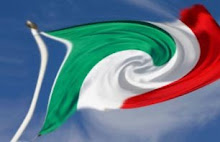
Some of them were made public. Others, the really juicy ones, were later destroyed after a judicial order. But, if secret they were meant to be, word got quickly around that countless wiretaps of Berlusconi phone calls exposed some sexually dubious behaviour by the Italian prime minister.
It didn't take long. In one of the conversations, as left-leaning
La Repubblica subtly wrote, Berlusconi "boasts about some of his female ministers' qualities". And in his defence of Berlusconi, conservative
Libero's editor Vittorio Feltri said that poor Silvio cannot be blamed if he likes "
la gnocca" (pussy).
By word of mouth, now everybody points the finger at the Equal Opportunities minister Mara Carfagna, a 32-year-old former beauty contestant and TV presenter, who recently became the youngest minister ever in Italy. Many Italians, who maligned at the time on the reasons for such a quick ascent to power, now can't refrain from snickering.
In another conversation, published by
L'Espresso magazine, Berlusconi - at a time when he was just the opposition leader - pressures a state TV manager to find a role for a little-known starlet who keeps saying the prime minister wants to block her career. One would wonder why. Anyway, that's a plain Italian-style recommendation, and not based on work merits.
A plethora of right-wing journalist, and of course politicians of his coalition, rose up to defend Silvio: his private life is his business, shame on the communist judges and journalists who revel in listening to his conversations. Many Berlusconi voters would probably think the same. After all, everybody makes recommendations in Italy, and most Italians didn't understand what the fuss was about, when the US got stuck into the Clinton-Lewinsky affair. The concept of resigning must be so absurd that nobody even mentions it. If somebody dared to, he would be quickly ridiculed.
Yet, nobody seems to get the ethical point. Shouldn't the prime minister explain to his voters if the "qualities" of one of his female ministers were a factor in giving her the job? Doesn't anybody see anything wrong in a prime minister who, when not even in power, uses his influence to favour somebody's career - in Berlusconi's case with a clear conflict of interests, as he appears to have a say in the decisions of the company that rivals his three TV channels? And don't Berlusconi's female voters have anything to complain about how these episodes confirm the depressing situation of "equal opportunities" in Italy?
In some Northern European countries, it would have taken much less to prompt a politician to resign spontaneously. Last April, Finland's Foreign minister
resigned after the media exposed his sending improper text messages to a dancer. In October 2006, Sweden's culture minister
resigned after she admitted paying a nanny under the table. But it's not just civil Scandinavians that can look down on Italians. In July 2007, Japan's defence minister
resigned after suggesting that the atomic bombings of Hiroshima and Nagasaki were inevitable. Last January, Malaysia's health minister
resigned Wednesday after acknowledging that he and a female friend were the couple in a secretly filmed sex video. And right today, Kenya's finance minister has
resigned after being named in a corruption scandal. Had these cases happened in Italy, it wouldn't have been enough to get a resignation. And whoever had been caught in one of these scandals, they would have said it was all a plot against them.
 Three months after the elections, when Berlusconi aroused the traded unions into rejecting Air France's plan and promised a quick solution, the Alitalia saga still looks neverending. The ailing state-controlled air company, after long and overdue negotiations, was about to be sold to the French. Staff cuts were necessary, as Alitalia was (is) virtually bankrupt, and the deal looked reasonable to most observers.
Three months after the elections, when Berlusconi aroused the traded unions into rejecting Air France's plan and promised a quick solution, the Alitalia saga still looks neverending. The ailing state-controlled air company, after long and overdue negotiations, was about to be sold to the French. Staff cuts were necessary, as Alitalia was (is) virtually bankrupt, and the deal looked reasonable to most observers.






